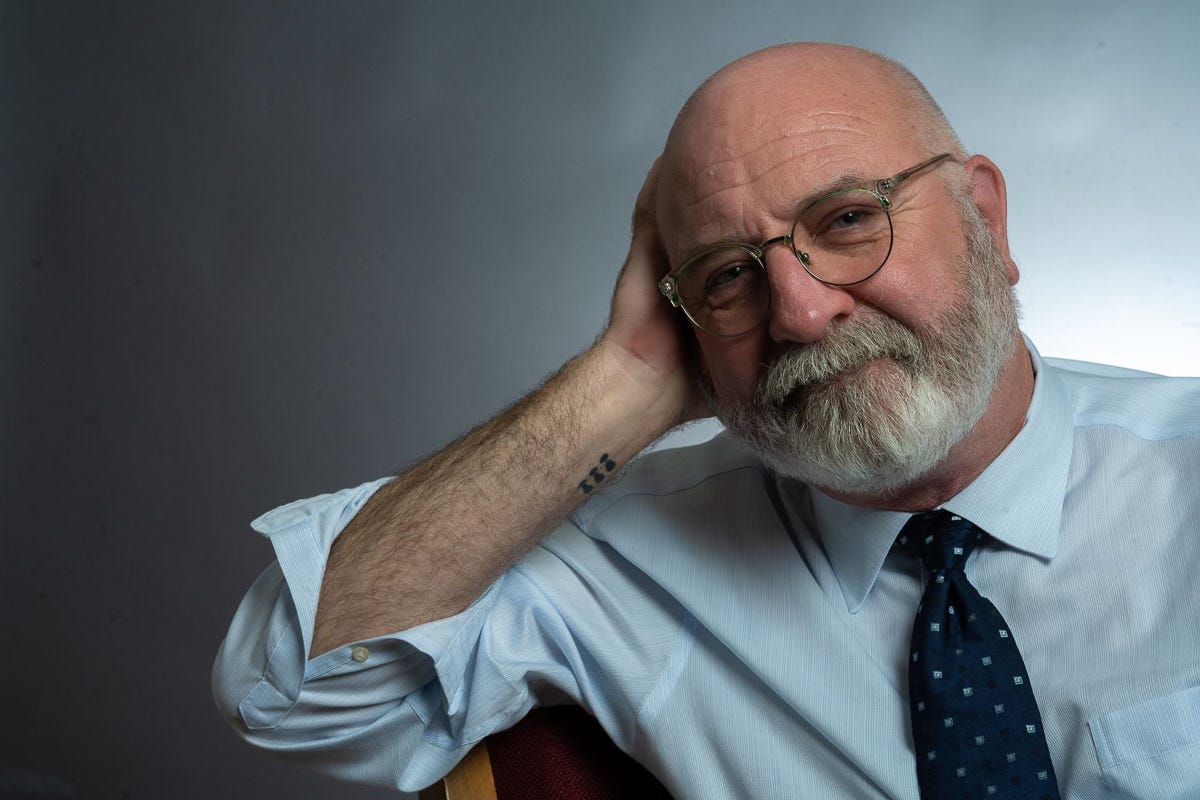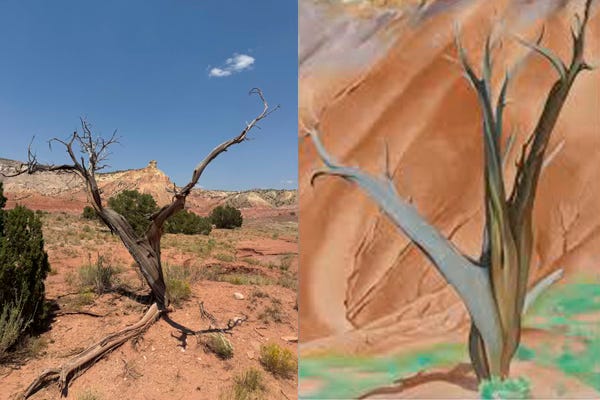Georgia O’Keeffe made her fortune selling flowers. But it was her depiction of landscapes that changed the way we see the world.
Last Monday, we took our kids and daughter-in-law to one of our favorite spots in Northern New Mexico — Ghost Ranch. That’s where O’Keeffe lived and painted for much of her adult life. And because of the arid climate, seeing Ghost Ranch today is like walking onto a 100-year-old movie set that hasn’t been touched.
On the landscape tour offered at Ghost Ranch, you pile on a short bus and spend about two hours along the dirt roads of the 21,000-acre ranch, hearing stories about the land and the artist and then getting off the bus six or so times for incredible experience after incredible experience.
You stand looking at the landscape and then the tour guide holds up a print of an O’Keeffe painting and you realize you are standing in the very spot where she stood. And nothing has changed.
For example, in 1937 O’Keeffe painted “Gerald’s Tree,” a simple representation of a petrified tree trunk and branches. We stood right in front of that same tree, and you can judge for yourself by the photos whether anything has changed.
When she died in 1986, O’Keeffe left behind an estate worth $72 million. Much of that wealth came from her close-up paintings of flowers — her best-known and most beloved work. An example is “Jimson Weed/White Flower No. 1,”which sold at auction in 2014 for $44.4 million and holds the record for the most expensive artwork by a woman ever sold.
I love the flowers but I also love the landscapes. Our tour guide said O’Keeffe once quipped: “Everyone notices how large my flowers are but no one notices how small my landscapes are.” That’s likely a paraphrase, of course, but you get the point. O’Keeffe’s flowers are huge, in-your-face, like seeing through a powerful magnifier. She made 3-feet-wide paintings of 2-inch flowers.
She brought that same artistic magnifying glass to her landscapes, but the result is less obvious — until you’re standing where she stood.
Remember that when O’Keeffe started painting in the early 20th century, people were accustomed to landscape paintings showing sweeping vistas, minute detail and panoramas as wide as the eye could see. Into that world, she brought a zoom lens with her paint brush. Most of her landscapes focus on small details, isolated and magnified to fill the panel.
For example, in “Red Hills with Pedernal,” she portrays her favorite nearby mountain but in isolation from the wider landscape and juxtaposed with a mound of red hills most observers would look past to see the mountain.
In “Lavender and Green Hill Ghost Ranch,” she focuses on what looks like five eyes at the top of some petrified dunes. From where we stood last Monday, we saw those same dunes but we also saw more mountains behind them. “Did she edit out the mountains?” one tour participant asked.
No, the guide responded, she just got closer to the dunes.
We couldn’t walk that close to the dunes, so we didn’t have the same perspective O’Keeffe got in her modified Model A car with swivel seat and space for a built-in easel. But if we could have, the guide assured us, all we would see above would be blue skies; the mountains would drop out of view.
I’ve been fixated on that story for days now, thinking about how our perspective changes everything. Sometimes being too close to a problem causes us to miss important data in the adjacent space. But sometimes looking too broadly causes us not to see the details that matter up close.
There’s a place for both vantages.
What we’re doing here with the news every day is a mixture. Sometimes we show you the big picture and explain how things relate. And sometimes we focus on the details and take you inside the mountain. It takes both approaches to understand the world today.
That’s true of life as well. Thus that old saying about not being able to see the forest for the trees. But it’s equally true we can miss the tree because we only see the forest.
Page 2
As we seek to understand the wildly different ways Americans view our present moment, perspective plays a crucial role.
That’s why I wrote an opinion piece telling the individual stories of two people I know who have been harmed lately by the Trump administration’s policies. Pay attention to their stories and imagine it could be you.
From Donald Trump’s gilded castle view, the city of Washington, D.C., is awash in crime and homeless people and doesn’t shine like the top of the Chrysler Building. From the vantage of people who live normal lives in the District, things have been looking better and there certainly is no crisis.
Yet Trump — once again — expertly appeals to the biases and fears of so many Americans who never have stepped foot in D.C. He knows they see big cities as dark and scary places where they would not be safe if they chose to visit.
Robert P. Jones gets at this dichotomy in a great piece this week, beginning with memories of his father telling the family as they drove on vacations through big cities, “Lock the doors, kids!”
Yet today Jones lives in suburban D.C. and works not far from the White House. What Trump says is happening and what Fox News has made people fear is happening is not what’s really happening, he reports. And he shares photos to make the case.
Julie Pennington-Russell serves as senior pastor at First Baptist Church of the City of Washington, D.C., and she has some thoughts about what it means to seek the peace of the city.
Rick Pidcock is interested in the language Trump uses to describe his perceived “bedlam” in D.C. and says this is a continuation of the president’s racist dog whistles that no longer can be denied.
Rodney Kennedy compares Trump to P.T. Barnum as someone who will say anything because he believes everyone else is a sucker.
Page 3
Of all the words misused by evangelicals, “pro-life” and “pro-family” have to be top of the list. They have shown their political agenda time and again to be only “pro-fetus” and “pro-white Christian family.”
Thus it should be shocking — but it’s not — that the circle of “pro-family” enterprises linked to James Dobson goes out of its way to bless and promote the MAGA agenda. The latest evidence is this cabal’s blind support for Israel even as Benjamin Netanyahu bombs and starves the people of Gaza into oblivion.
There is plenty of empirical and on-the-ground evidence that Israel is blocking aid from getting to the very people they’ve impoverished. And the word “genocide” is being used more frequently to describe what’s happening.
This week, a coalition of 100 international aid groups signed a letter calling Israel to account for its cruelty. The evidence is damning.
But in the same week, the Family Research Council promoted the lie that Israel bears no responsibility for all this horror. This is so insanely wrong as to be laughable, but they’re not laughing. They are parroting the propaganda of the Netanyahu administration in service of their commitment to an end-times theology.
What can be “pro-family” or “pro-life” about supporting the murder and slow torture of the Palestinian people?
Meanwhile, Bill Leonard takes up the case of the “already born” in his lament of how the Trump administration is attacking Medicaid and health care.
And speaking of life and death, Tennessee continues to draw scrutiny for the way it handles executions, most recently the execution of a mentally incompetent man whom the governor refused to consider.
Erich Bridges says the Old Testament prophets have a word from the Lord for Trump and his administration: “Take your evil deeds out of my sight; stop doing wrong. Learn to do right; seek justice. Defend the oppressed. Take up the cause of the fatherless; plead the case of the widow.”
And Michael Chancellor points again to the inherent cruelty in all this.
Page 4
In other analysis this week:
Something struck me as odd when I read the news that Roswell Street Baptist Church in Marietta, Ga., has become a satellite campus of First Baptist Church of Woodstock in far north suburban Atlanta. That led to an analysis piecewhere I explain the rise of the multisite church model and why this particular case is far different than most.
Mallory Challis explains how initiatives to remove “woke” content from school curricula across the United States, comprehensive sexual education is under attack.
Page 5
In other news this week:
Police in Brentwood, Tenn., have opened an investigation into multiple allegations of sexual abuse against former Newsboys frontman Michael Tait.
Kim Davis is back in the news. The former Kentucky county clerk now has filed an appeal with the U.S. Supreme Court that could pave the way for reconsideration of the 2015 decision legalizing same-sex marriage nationwide.
The president of the United States has the power to make unwise decisions but still must follow procedures to do so, a federal court ruled Aug. 14 in a rebuke to the Trump administration’s efforts to purge public schools of DEI programs.
Five veterans have been executed since Ron DeSantis became governor of Florida in 2019 with a sixth scheduled to die this month. A veterans’ group says that should stop.
What might be the nation’s smallest Protestant denomination — if you can call it that — has hired its first part-time director.
Laura Loomer doesn’t work for the government, but the right-wing social media star and conspiracy theorist has Donald Trump’s ear, and she has used her influence to have more than a dozen top administration officials fired.
A federal lawsuit filed Aug. 11 objects to the “sudden and unlawful” cancellation of parole status of immigrants living and working in Massachusetts since entering the U.S. legally between 2023 and Jan. 19 this year.
A federal court in Miami has ordered Florida to temporarily pause construction of the “Alligator Alcatraz” immigration detention center. And ICE is now hiring “patriotic Americans” as young as 18.
The organization that unsuccessfully sued the U.S. Department of Education to stop religious exemptions to Title IX for LGBTQ students at Christian universities is disbanding.
Defense Secretary Pete Hegseth has come under public fire for publicly endorsing the misogynistic views of Idaho pastor Doug Wilson and his colleagues in a CNN interview.
Elon Musk has left Washington, D.C., but a who’s who of secular and Christian conservative leaders says the Trump administration should continue making chainsaw-style cuts to federal departments and programs Congress previously approved.
United Methodists’ commitment to overcoming racism is still rising, Cynthia Astle reports.
Equal Justice USA announced it will shut down due to the Trump administration’s revocation of more than $3 million in federal grant funding.
Page 6
In other opinion this week:
Mallory Challis wonders why Lawrence Julius Taylor, who pled guilty in 2011 to two misdemeanor charges of sexual misconduct and patronizing a prostitute after having sex with a 16-year-old girl who was being sex trafficked, has been named to the President’s Council on Sports, Fitness and Nutrition.
Michael Chancellor says Baptist state conventions through their denial of sexual abuse have betrayed the historic wisdom that kept churches together. In a separate piece, Michael imagines a world washed clean of meanness, inhumanity, greed and hate.
John Carpenter says The Gospel Coalition’s flagship journal, Themelios, has a problem with Baptists.
David Haddad gives us a fascinating look at the influence of William Jennings Bryan apart from the Scopes trial. You’ll be surprised.
Barry Howard has been traveling in the Netherlands and explains why so many churches there have roosters on their steeples.
Given the current state of the United States, Canada is looking more promising, Brett Younger reports after a recent vacation trip.
Sarah Boberg says families need to create their own spiritual rhythms apart from what happens at church.
Marcus Lewis says he’s staying in the SBC and issues a call to reform from within.
Greg Garrett interviews Reggie Williams, who has a new book on Dietrich Bonhoeffer and the Black church experience.
Justin Cox asks the musical question, “Which side are you on?”
Tyler Hummel says the reboot of King of the Hill reminds us change can be good too.
A final word
Thanks to Marv Knox for filling in for me during my vacation. Hopefully you didn’t notice anything amiss. I am thankful to have such a competent friend and colleague who shares a love for this important work and does it so naturally.
We had a great time in Santa Fe, but whoever thought it was a great idea to take a two-week vacation was misguided. Seemed like a good idea at the time.
Now, back to the work.
Mark Wingfield
Executive Director and Publisher
Baptist News Global





